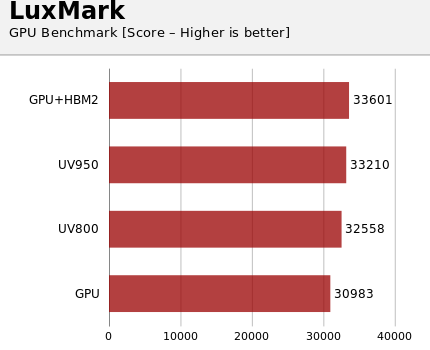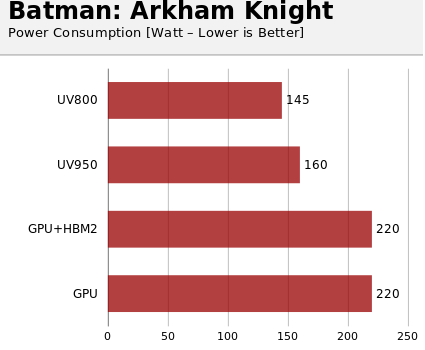All the following results are the arithmetical average of 3 benchmark runs, if there are abnormal scores they’re discarded and another benchmark run is made.
LuxMark. There isn’t much to be said about it. Being purely OpenCL it’s (obviously) GPU-limited. The performance improvement with the overclock of the HBM2 is the absolute highest among all the benchmarks. The same results (regarding power consumprtion) are shown by rendering an object in SolidWorks with Radeon ProRender.

Assassin’s Creed Origins, as everyone knows, shows the disaster done with 2 DRMs (Denuvo+VmProtect). With my Ryzen is extremely CPU-limited in certain parts of the benchmark. In fact, the power consumption is the absolute lowest, stock or undervolted… Most of the problems are in the city part, where FPS lower to 45, with some low peak at 25. HBM2 overclock improves very slightly the performances, but not in the city.

Batman: Arkham Knight… the most unexpected (positive) surprise, knowing all the problems it had. What do I have to say… it’s the best running game among those tested (but it’s the oldest, same as GTA V). Power consumption is nearly the same as Far Cry 5. HBM2 overclock still enhances performances, but only max FPS have an appreciable enhancement.

Far Cry 5 runs perfectly, as to be expected, FPS are always above 60. It’s the most power-hungry game, perhaps because it’s the only one optimized for the Ryzen/Radeon dream team. HBM2 overclock lightly enhances performances.

GTA V is the negative surprise of today’s tests. Scores are incredibly low, and is CPU limited (that explains the low power consumption). It’s maybe the most Ryzen-hating game, and that’s confirmed by other tests online. Everything is set at ultra, except for FXAA (since there’s the MSAA) and shadows (having a Radeon I chose AMD CHS).HBM2 overclock has nearly no effect (+1-2FPS), and the experience is the same (bad) one.

Final thoughts
Playing Forza Horizon 3 (1080P 60FPS VSync, everything set to ultra except for motion blur since I hate it) average power consumption lowers from 150W to ~85W, confirming that the undervolt heavily raises the efficiency. We have to admit that: Vega chips for gaming are (at least at stock settings) a half disaster: they aren’t as fast as the competition (except for ultra-rare cases), they’re hot and power-hungry. But, with a bit of tinkering in WattMan you can lower their power usage by 100W without losing performance.



















